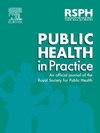20 years on from the Dublin Declaration: European Committee for the Prevention of Torture and Inhuman or Degrading Treatment reporting on the provision of prison needle and syringe programmes in the Council of Europe region
IF 2.2
Q2 PUBLIC, ENVIRONMENTAL & OCCUPATIONAL HEALTH
引用次数: 0
Abstract
Background
Prisons in Europe remain high-risk environments and conducive for infectious disease transmission, often related to injection drug use. Many infected people living in prison unaware of their infection status (HIV, hepatitis C). Despite all Council of Europe (CoE) member states providing community needle and syringe programmes (NSP), prison NSP are limited to seven countries. The study aim was to scrutinise the Committee for the Prevention of Torture and Inhuman or Degrading Treatment (CPT) reporting of periodic and ad hoc country mission visits to prisons, with an explicit focus on the extent to which member states are/were fulfilling obligations to protect prisoners from HIV/hepatitis C; and implementing prison NSP under the non-discriminatory equivalence of care principle.
Study design
Socio-legal review.
Methods
A systematic search of the CPT database was conducted in 2024 with no date restriction. All CPT reports were screened in chronological order with the terms; “needle”, “syringe”, “harm reduction” and “NSP”. Relevant narrative content on prison NSP operations, including repeat CPT reminders and any official/publicly expressed reasons for not implementing is presented.
Results
CPT reporting reveals limited prison NSP provision in selected prisons visited on mission, with little change in status over time, despite documented evidence of prior observations around absent/insufficient harm reduction measures and explicit (often longstanding) recommendations to address deficits. Reasons for not implementing prison NSP include; existing availability of opioid substitute treatment, lack of evidence for injecting drug use, for security and maintenance of order, and contradiction with prison protocols sanctioning drug use.
Conclusions
Prison health is public health. Regular research and evaluations of prison NSP in Europe are warranted. Future CPT visits should also continue to assess availability and standards of provision; recommend where appropriate including when opioid substitute treatment is already provided, and in line with broad availability of community NSP in Europe.
都柏林宣言》发表 20 周年:欧洲防止酷刑和不人道或有辱人格待遇委员会关于在欧洲委员会地区提供监狱针头和注射器方案的报告
背景欧洲的监狱仍然是传染病传播的高危环境和温床,通常与注射吸毒有关。许多生活在监狱中的感染者并不知道自己的感染状况(艾滋病毒、丙型肝炎)。尽管欧洲委员会(CoE)所有成员国都提供社区针头和注射器计划(NSP),但监狱 NSP 仅限于七个国家。研究目的是仔细审查防止酷刑和不人道或有辱人格待遇委员会(CPT)定期和特别国家特派团访问监狱的报告,明确重点关注成员国在多大程度上履行了保护囚犯免受艾滋病毒/丙型肝炎感染的义务;以及根据非歧视性同等护理原则实施监狱 NSP 的情况。以 "针头"、"注射器"、"减低伤害 "和 "NSP "为关键词,按时间顺序筛选所有 CPT 报告。结果CPT报告显示,在执行任务时访问的部分监狱中,监狱NSP的提供非常有限,而且随着时间的推移,状况几乎没有变化,尽管有文件证据表明以前观察到的减低伤害措施缺失/不足,以及解决不足的明确(通常是长期)建议。未实施监狱 NSP 的原因包括:现有的阿片类替代治疗、缺乏针对注射毒品使用、安全和秩序维护的证据,以及与制裁毒品使用的监狱规程相矛盾。有必要定期研究和评估欧洲的监狱国家战略计划。欧洲防止酷刑委员会今后的访问还应继续评估提供情况和标准;酌情提出建议,包括在已经提供阿片类替代治疗的情况下,并与欧洲广泛提供的社区 NSP 保持一致。
本文章由计算机程序翻译,如有差异,请以英文原文为准。
求助全文
约1分钟内获得全文
求助全文

 求助内容:
求助内容: 应助结果提醒方式:
应助结果提醒方式:


